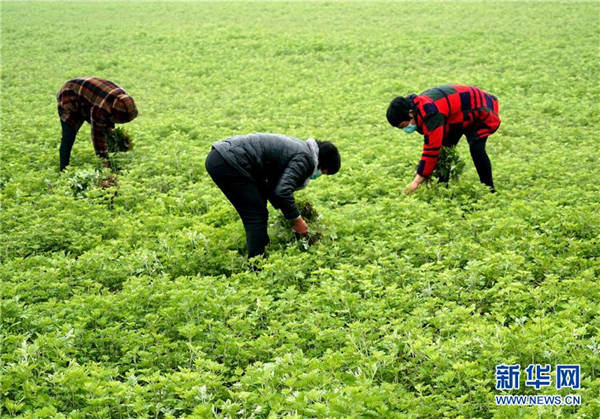Herb brings good dose of healthy economic medicine


For many years, mugwort was nothing but wild grass to locals in Central China's Henan province. People rarely paid it any mind, except when the Dragon Boat Festival sailed into view-a time that they hang bundles of it on their front doors by tradition.
Today, however, with a complete industrial chain covering the growing, processing, and sales of mugwort, it has become a cash cow that has lifted villagers out of poverty and is leading them to prosperity.
Formerly impoverished villager Cui Tinggui in the rural area of Nanyang city cannot work in big cities as he has his ailing mother to take care of at home. By growing mugwort, he can earn 2,000 yuan ($311) per mu (0.07 hectares) of the plant every year.
"I never expected that growing grass would become a way of making a living," says Cui, 43, adding that his family shook off poverty thanks to mugwort.
Mugwort, a kind of herb mainly used in moxibustion as a traditional Chinese medicine therapy, has apparent effects. They include fumigating, eliminating dampness, and killing insects and bacteria. Moxa soap, lotion, essential oil, and pillow products are also popular with Chinese consumers as they are considered healthy.
"The treatment effect and health functions of the herb have generated vigorous market demand," says Wei Yuezhi, head of the city's mugwort industry association.
Nanyang is China's major mugwort planting and production base, with a growing area of 24,000 hectares, contributing to 70 percent of the country's total amount of wild and artificially planted mugwort crops.
In a mugwort processing cooperative in Nanyang's Wancheng district, boxes of moxa products are piled in the workshop, waiting to be delivered.
"Many online stores order products from us and then sell them across the country," says Hui Dawu, a manager of the cooperative.
According to the city government, Nanyang has more than 1,500 companies involved in mugwort plantation and processing. More than 100,000 residents are employed in the sector, contributing to an annual industrial output of 10 billion yuan.
Chen Zengxi, former head of the science and technology bureau of Wancheng district, is optimistic about the prospects of the mugwort industry, as the fight against the COVID-19 pandemic has helped raise awareness of TCM worldwide.
"With more people learning about TCM, traditional Chinese medical therapies, including Nanyang moxibustion and acupuncture, will hopefully spread worldwide and benefit people globally," he says.




































